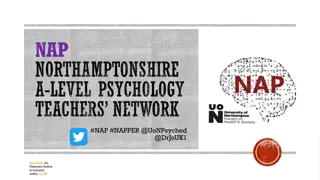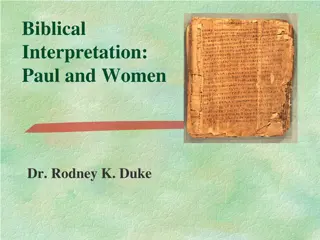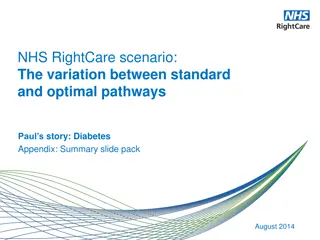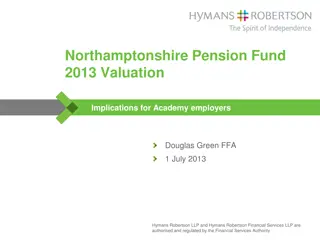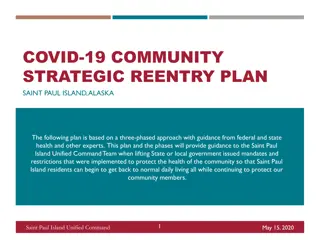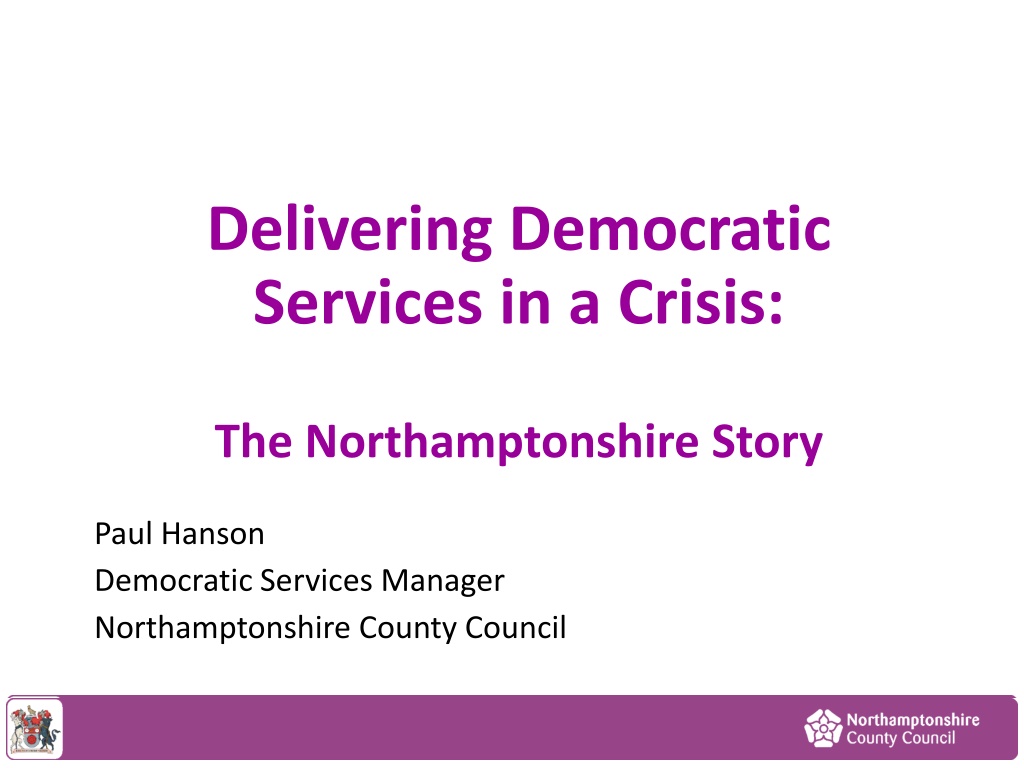
Managing Financial Crisis: The Northamptonshire Council Story
Explore the timeline of Northamptonshire County Council's financial crisis, governmental intervention impact, and the vital role of Democratic Services. Discover how to avoid similar situations and support your authority. Delve into the challenges faced by the Council, key developments, and strategies implemented to navigate through the crisis period.
Download Presentation

Please find below an Image/Link to download the presentation.
The content on the website is provided AS IS for your information and personal use only. It may not be sold, licensed, or shared on other websites without obtaining consent from the author. Download presentation by click this link. If you encounter any issues during the download, it is possible that the publisher has removed the file from their server.
E N D
Presentation Transcript
Delivering Democratic Services in a Crisis: The Northamptonshire Story Paul Hanson Democratic Services Manager Northamptonshire County Council
What this session will cover A timeline of Northamptonshire County Council s well- publicised difficulties. The impact of Government intervention. The role of Democratic Services. How you can support your authority to avoid a similar situation.
Summer 2017 After years of financial difficulties, the interim Chief Finance Officer instigates a Peer Review by the LGA. The LGA s team are given the following brief: 1. Is there anything the Council is not doing but should consider to manage budget pressures in the long term? 2. Is there anything the Council should be doing to generate new income streams? 3. Are arrangements for budgetary control and delivery appropriate and effective? 4. Are arrangements for keeping the Cabinet informed of budget management and mitigation options effective? 5. How can the Council build support for its financial position at Westminster?
September 2017 The Council announces the launch of a campaign to secure fairer funding for Northamptonshire . Meanwhile, six peer reviewers arrive at the Council. Over a three day period, the peer review team interview 39 individuals, including officers, councillors and the external auditor. The conclusions of the review are stark.
Peer Review Outcomes Time is running out for Northamptonshire County Council The Council does not have robust and deliverable plans for its long-term financial sustainability. There is a very short-term focus on solving financial problems. Members place trust in the approaches proposed by officers without challenging the plans at an early stage. There is no financial strategy to deliver a sustainable position for the Council. Unrealistic savings targets have been built into budgets.
Autumn 2017 On Friday 13thOctober, the Chief Executive resigns his post after 10 years at the Council. He is replaced on an interim basis by the Chief Finance Officer. The next working day, the Council announces a series of in-year savings proposals affecting libraries, trading standards, children s centres and bus subsidies. On 31stOctober, staff are told they must take unpaid leave and additional spending controls are introduced.
December 2017 A new Chief Finance Officer takes up his post. The Council announces 34.3m of savings proposals as part of its draft budget for 2018-19. The interim Chief Executive: this is the last year we will be able to set a balanced budget without beginning to impact statutory services . The Council continues to lobby the Government in the hope that the Government will announce changes to the funding formula.
January 2018 On 10thJanuary 2018, the Secretary of State responds by announcing that Max Caller CBE will undertake a Best Value inspection of the Council s financial and governance arrangements. The Inspector is asked to report on whether the Council: o Plans and manage its finances effectively; o Provides clear information to councillors to inform decision making; o Allows for adequate scrutiny by councillors; and o Manages services within budget constraints. On 25thJanuary, the Council announces it is planning to sell and lease back its new HQ, One Angel Square.
February 2018 The Council maintains that its problems are caused primarily by an unfair funding formula as well as unprecedented growth in demand for services. On 2ndFebruary, two months after taking up his post, the Chief Finance Officer issues a Section 114 Notice; the first to be issued since October 2000 (Hackney). This action was precipitated by the failure to complete a land sale which would have generated a capital receipt. On 14thFebruary, the Cabinet agrees the proposed budget for 2018-19. On 20thFebruary, before the budget can be ratified, the external auditor issues an Advisory Notice.
February 2018 (continued it was a busy month) The Auditor s Advisory Notice warns that the Council may be about to agree a budget that is unlawful. Their concern stems from the Council s plan to rely on from the sale of assets something that the Council can only do in order to fund transformational expenditure . Council meets on 22ndFebruary to consider the S.114 Notice, the Advisory Notice and to agree the budget. Emergency Cabinet and Council meetings follow on 27th and 28thFebruary. Additional savings to the value of 10m are agreed, including a pay cut of up to 20% for councillors. After the meeting, the Leader of the Council loses a confidence vote amongst group members.
March 2018 The Inspector publishes his Best Value Report on 15thMarch, a day ahead of schedule (the Ides of March ). The report concludes that the Council has failed to comply with its Best Value duty under the LGA 1999. He concludes that the Council lost control over spending following an adverse Ofsted judgement in 2013. The Next Generation operating model is criticised for being unable to deliver the necessary savings. There was not then and has never been any hard edged business plan or justification to support these proposals, yet Councillors, who might well have dismissed these proposals for lack of content and justification in their professional lives, adopted them and authorised scarce resources in terms of people, time and money to develop them . The report concludes with a detailed proposal to replace all eight councils in Northamptonshire with two unitary councils.
March May 2018 15thMarch the Leader of the Council resigns. 21stMarch the interim Chief Executive steps down and is replaced by an interim Chief Executive. 29thMarch the Council announces that it will use all of its cash reserves to attempt to balance its books. 16thApril the sale of the Council s HQ is signed off. 10thMay the SoS issues a Direction under the LGA 1999 to Northamptonshire County Council and announces the appointment of two Commissioners. Tony McArdle, former CX of Lincs CC is appointed as Lead Commissioner. Brian Roberts, former CFO of Leics CC is appointed as Finance Commissioner.
July August 2018 The Council holds four extraordinary meetings over a six week period in the summer. A second S.114 Notice is issued on 24thJuly for the period 2018-19. Council meets to consider the second notice. Supported by the Commissioners, Council agrees a hierarchy to shape priorities for resource allocation and also confirms the appointment of a new Chief Executive. During bank holiday week, all eight councils in Northamptonshire hold meetings to agree their submissions to the SoS on local government reform in the county.
A re-cap of 2018 Two S.114 Notices; One Advisory Notice from the external auditor; One Best Value inspection; One leader resigned; One leader appointed (and a new Cabinet); Two Commissioners appointed; Three Commissioners appointed; Five chief officers departed; Three new chief officers appointed; and One well-thumbed copy of Knowles!
A practical exercise How would you lead your service through a similar situation? Each group should focus on one of the following themes: 1. How could Democratic Services help prevent such a crisis? 2. How could you help your overview and scrutiny function to play a part in prevention? 3. What would your priorities be if your organisation faced a similar crisis? 4. What role can Democratic Services play in managing political relationships in a crisis? What would you need to do? How would you do it? What outcomes would you seek to achieve? Ten minutes to discuss and then feed back.
The Commissioners The Commissioners have the power to intervene in any of the Council s functions (except development control). Unlike other recent interventions, the Commissioners made it clear from the outset that they would not take direct control of the Council s decision making processes. Instead, they provide oversight and guidance and reserve the power to direct. Our governance and decision making has carried on, albeit with a significant change in personnel and a much tighter focus on renewed priorities. Democratic Services has had to play a greater than expected role in both managing significant change and preparing for new ways of working.
Immediate priorities for Decision Making There was a significant gap between the Chief Executive and Leader departing and the Commissioners and a new Chief Executive being appointed. During this time, senior leaders required guidance on less familiar aspects of local authority governance. Democratic services provided advice on dismissing and appointing the Leader, changing governance arrangements, dealing with S.114 notices and auditor s Advisory Notices, all in the space of a few weeks. There is never a bad time to tighten up your processes. For example, does your report template encourage officers to detail the outcomes of EqIAs?
Overview and Scrutiny Best Value report cited overview and scrutiny as an area where performance fell short. Members engaged in scrutiny had raised concerns about not having access to the information they needed. That is only part of the story, however. Some members demonstrated a lack of curiosity and/or a lack of focus. The culture of the organisation and the attitudes of senior leaders played a significant part in this failure.
Fixing Overview and Scrutiny Democratic Services arranged for the Centre for Public Scrutiny to provide support in response to feedback on budget scrutiny. This turned into a full review by the CfPS. This pre-dated the Commissioners, but they were engaged once appointed. Councillors wanted more resource for scrutiny, but the message from the CfPS was clear: Focus, focus, focus! The business as usual model of thematic committees was replaced with a single committee focussed on budget and recovery plan. From first sight of the draft CfPS report to agreeing a completely new way of working at full council 30 days.
Supporting members We hastily re-designed member development in order to focus on priorities rather than business as usual. 40% of councillors were newly elected in May 2017. Support was available from the LGA. All members were offered back to basics training on local authority finance. Our officers provided training with a focus on finance. More tailored support was provided to new cabinet members and scrutiny councillors (CfPS). Democratic services teams should do everything possible to help members understand the depth of the crisis. Business as usual is your enemy!
Managing relationships One of the biggest challenges has been to understand and manage the expectations of the commissioners, councillors and the (largely) new senior leadership team. For example, the councillors particularly wanted to finish one particular scrutiny project that had already started. Senior leadership team was supportive. But what happens if the recommendations that flow from the review do not accord with the views of the new leadership team? Democratic services have to work hard to triangulate competing and contrasting outcomes in a very fluid environment.
Key messages Are your members equipped to recognise a crisis and will they act to avert it? Does your scrutiny function get the support it needs from the organisation? Don t be defensive. Recognise the need for change and be the catalyst. Get help. The LGA, CfPS and ADSO are great resources.






